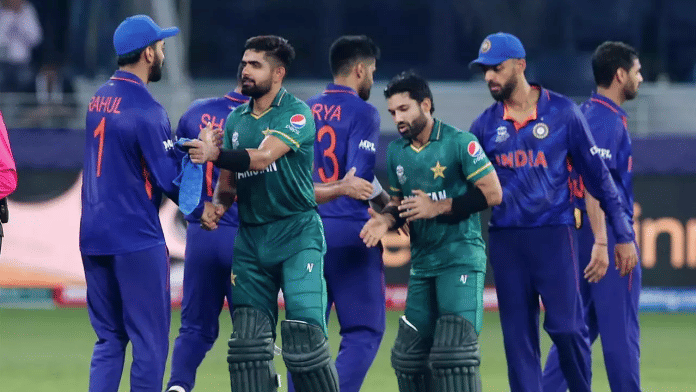Last Friday, New York—a city for which the sport called cricket is mostly alien —woke up to witness the greatest cricketing rivalry: India vs. Pakistan at Nassau Stadium. As this grand sporting spectacle played out in the United States, far away in India, in a place called Reasi in Jammu and Kashmir, fellow citizens of the men in green had fixed a date too. On 9 June, terrorists affiliated with Pakistan’s Lashkar-e-Taiba attacked a bus carrying Hindu pilgrims heading to the Mata Vaishno Devi shrine in Katra. Nine of these civilians died – including two-year-old Kitu Sawhney and 14-year-old Anurag Verma.
Some Indians have rued the fact that our country only plays against Pakistan in world championships and not in bilateral series since the 26/11 terror attack.
To them, I would like to ask: Why do we even play against them in world championships? The Pakistani cricketer on the 22-yard pitch and the terrorist from his soil both represent not just the same country but the same institutionalised hatred against India, particularly Hindus. It’s just that one directly kills our civilians, while the other supports a system that sees jihadists as heroes and martyrs. Anyone who says that sports should be separated from politics is either delusional or a Pakistani.
Pakistani cricketers on Kashmir
Let’s take the examples of some of the most famous Pakistani cricketers and their comments on Kashmir:
- Shahid Afridi: Afridi has openly supported the Kashmiri separatist movement and has repeatedly made controversial statements. “India’s continued attempts to silence critical voices against its blatant human rights abuses are futile. Fabricated charges against #YasinMalik will not put a hold to #Kashmir‘s struggle to freedom. Urging the #UN to take notice of unfair & illegal trails against Kashmir leaders,” he tweeted. He also compared Indian Prime Minister Narender Modi to the Covid-19 virus while speaking on the Kashmir issue.
- Shoaib Akhtar: Akhtar has also frequently commented on the Kashmir issue, often aligning with the Pakistani government’s stance. He has called for international intervention on the issue and has expressed his views on the need for a resolution that favours Pakistan’s position on Kashmir. In an interview with Samaa TV, he even mentioned Ghazwa-e-hind (holy war against India).
- Imran Khan (former Pakistan cricketer and PM, now jailed by the Army): Imran has often cited Kashmir on international platforms. He even accused India of committing genocide of Muslims in Kashmir in one of his tweets.
Prominent Pakistani cricketers have clearly not shied away from making controversial statements about Kashmir, often aligning with their state’s narrative. These comments reflect a narrative that views the conflict in Kashmir through a religious and ideological lens. Terror groups like Lashkar and Hizbul are perceived as freedom fighters involved in pious Jihad in Kashmir.
Also read:
Data speaks for itself
Now, let’s go a step further. What does this 2011 Pew Research Centre survey say about the viewpoint of average Pakistanis toward Hindu majority secular India?
A majority of Pakistanis (57 per cent) considered India the primary threat, while only 19 per cent cited the Taliban and merely 5 per cent identified al Qaeda as the most significant concern. Furthermore, just 36 per cent of Pakistanis viewed Lashkar-e-Taiba negatively.
So, 57 per cent viewed Hindu-majority India as an enemy, while only 36 per cent firmly disapproved of Lashkar and its terror activities. This suggests that the average Pakistani considers the thousands of killings by Pakistani terrorists—of innocent civilian Kashmiri Pandits, Kashmiri Muslims, Muslim police officers in Jammu and Kashmir, Indian Army personnel, Intelligence Bureau (IB) officers, National Investigation Agency (NIA) officers, Anti-Terrorism Squad (ATS) officers, and civilians across India—as acceptable. It’s evident that Pakistani cricketers are not exempt from reflecting these sentiments, which are so prevalent among average Pakistanis.
One can argue that there is a minority section in Pakistan that doesn’t support such terrorist acts against Indian civilians. An example is Pakistani cricketer Hassan Ali, who posted on his Instagram story: “All eyes on Vaishno Devi attack.” However, Ali, whose wife Samiya hails from India, faced significant backlash, including death threats, prompting him to subsequently justify his stance and emphasise that he condemns all forms of terrorism. However, the backlash against Ali only highlights the average Pakistani mindset.
In the past week, the terror state of Pakistan continued its aggression with three consecutive attacks. This brings me to an important question: If the world could boycott the Apartheid state of South Africa, what stops our nation, a victim of countless terror attacks by Pakistan, from engaging with the country at global events?
Or have we normalised the thousands of terror attacks Pakistan has inflicted on us and our security forces in the last five decades? Cricket should continue because some Indians are missing the mouth-watering India-Pakistan rivalry on the field.
Two-year-old Kitu Sawhney died on the day we defeated Pakistan again. But are we truly winning, or have we simply grown accustomed to Pakistan’s tactics? Can even hundreds of Sawhneys not come in between the adrenaline rush we get while playing against a failed state on the ground?
Amana Begam Ansari is a columnist and TV news panelist. She runs a weekly YouTube show called ‘India This Week by Amana and Khalid’. She tweets @Amana_Ansari. Views are personal.
(Edited by Zoya Bhatti)







India Pakistan cricket is just hype for TV eyeballs and revenue. No longer is the Pakistan team a worthy competitor. It’s players are interested in displaying their religiosity more then any cricketing skills. Watching it is a pointless waste of time as it caters more to jingoism rather than sportsmanship. Best avoided like the Wagah border display.